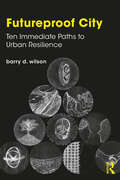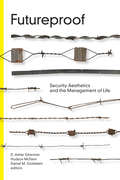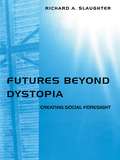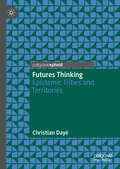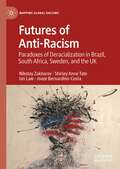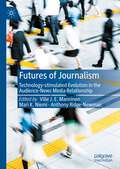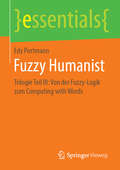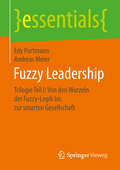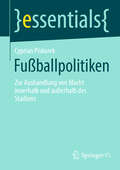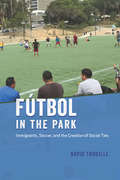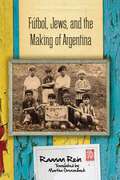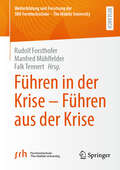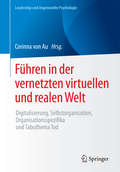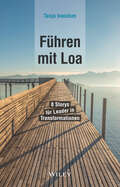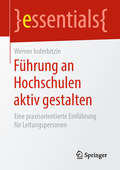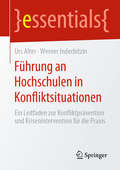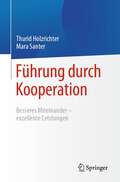- Table View
- List View
FutureShop: How to Trade Up to a Luxury Lifestyle Today
by Daniel NissanoffThis is a book about change. In particular, it's about how our consumer culture is rapidly evolving to allow us to live better, richer lives for less. The catalyst to this change is eBay and similar sites that are quickly growing into mainstream shopping venues and creating unprecedented levels of liquidity for our everyday goods. The wave of the future will be temporary ownership-consumers will be able to buy what they really want because they'll be able to easily sell it when they are ready to upgrade to the next item on their wish list. Veteran Web entrepreneur Daniel Nissanoff's invaluable heads-up explores why this change is taking place and discusses what consumers and businesses can do in order to benefit from this new paradigm.
Futureproof City: Ten Immediate Paths to Urban Resilience
by Barry D. WilsonThe Futureproof City creates adaptability and resiliency in the face of the unknown challenges resulting from technological change, population explosion, global pandemic, and environmental crisis. A paradigm shift is urgently required in the means of conceiving, delivering, and managing city development to create better places to live. This book brings to the fore many new solutions currently being proposed and piloted globally, identifying ten key areas affecting the physical fabric of our cities where governments, planners, investors, and the individuals responsible for shaping lives can refocus their understanding, priorities, and funding in order to more effectively utilise the limited financial, natural, and time resources available. It will be key reading for every policy maker and professional working in sustainability, development, technology, health and welfare, investment, and risk issues in cities today.
Futureproof: Security Aesthetics and the Management of Life (Global Insecurities)
by Daniel M. Goldstein D. Asher Ghertner Hudson McFannSecurity is a defining characteristic of our age and the driving force behind the management of collective political, economic, and social life. Directed at safeguarding society against future peril, security is often thought of as the hard infrastructures and invisible technologies assumed to deliver it: walls, turnstiles, CCTV cameras, digital encryption, and the like. The contributors to Futureproof redirect this focus, showing how security is a sensory domain shaped by affect and image as much as rules and rationalities. They examine security as it is lived and felt in domains as varied as real estate listings, active-shooter drills, border crossings, landslide maps, gang graffiti, and museum exhibits to theorize how security regimes are expressed through aesthetic forms. Taking a global perspective with studies ranging from Jamaica to Jakarta and Colombia to the U.S.-Mexico border, Futureproof expands our understanding of the security practices, infrastructures, and technologies that pervade everyday life. Contributors. Victoria Bernal, Jon Carter, Alexandra Demshock, Zaire Z. Dinzey-Flores, Didier Fassin, D. Asher Ghertner, Daniel M. Goldstein, Rachel Hall, Rivke Jaffe, Ieva Jusionyte, Catherine Lutz, Alejandra Leal Martínez, Hudson McFann, Limor Samimian-Darash, AbdouMaliq Simone, Austin Zeiderman
Futures Beyond Dystopia: Creating Social Foresight (Futures In Education Ser.)
by Richard A. SlaughterHow can dystopian futures help provide the motivation to change the ways we operate day to day?Futures Beyond Dystopia takes the view that the dominant trends in the world suggest a long-term decline into unliveable Dystopian futures. The human prospect is therefore very challenging, yet the perception of dangers and dysfunctions is the first step towards dealing with them. The motivation to avoid future dangers is matched by the human need to create plans and move forward. These twin motivations can be very powerful and help to stimulate the fields of Futures Studies and Applied Foresight.This analysis of current Futures practice is split into six sections:* The Case Against Hegemony* Expanding and Deepening a Futures Frame* Futures Studies and the Integral Agenda* Social Learning through Applied Foresight* Strategies and Outlooks* The Dialectic of Foresight and Experience.This fascinating book will stimulate anyone involved in Futures work around the world and will challenge practitioners and others to re-examine many of their assumptions, methodologies and practices.
Futures Thinking: Epistemic Tribes and Territories
by Christian DayéThis book starts from the assumption that futures thinking is difficult, yet of existential necessity. We live in times where the future of humanity is at stake. Thus, it is important to understand where the images of the future that currently circulate in our cultures and societies come from. This book is about two fields in the social sciences that explicitly concentrate on: futures studies and the sociology of the future. Informed by sociological theories, it applies bibliometric methods to describe these two fields as epistemic tribes and territories. After reflecting on the historical reasons for this bipartite academic institutionalization, the book explores how the two fields could achieve a diligent division of labor that encourages forms of futures thinking that speak to the societal and civilizational needs of our times.
Futures of Anti-Racism: Paradoxes of Deracialization in Brazil, South Africa, Sweden, and the UK (Mapping Global Racisms)
by Nikolay Zakharov Ian Law Shirley Anne Tate Joaze Bernardino-CostaThis book assesses the nature and extent of the project of deracialisation required to counter the contemporary dynamics of racialisation across four varieties of modernity: Sweden, South Africa, Brazil and the UK, based on original research on each of the four country contexts. Since racism began to be recognised or identified as a problem, an assemblage of supra-national initiatives have been devised in the name of combatting, dismantling or reducing it. There has been a recent shift whereby such supra-national bodies move toward embedding strategies against racism within the framework of human rights and devolving such responsibility to other bodies at a national level.The authors bring together a team of international experts in this field, in order to compare the priorities and effectiveness of current strategic approaches in each national context, examining their relationalities and connecting these cases within a joint theoretical and methodological framework. Thus, this book contributes to theoretical knowledge on racialisation and deracialisation, produce a new data set on contemporary interventions and institutions and establish new principles and practice for national projects of deracialisation and anti-racism, building on cross-national learning.
Futures of Journalism: Technology-stimulated Evolution in the Audience-News Media Relationship
by Anthony Ridge-Newman Ville J. E. Manninen Mari K. NiemiThis book examines how technologies are changing, will change, or could change the relationship between audiences and news media. It highlights how novel technologies could have fundamental implications for the way that news media interact with wider society. The book comprises of four thematic parts. Firstly, it focuses on the impact of technological development on the news media business, exploring how news media uses new technologies to improve their sustainability. Secondly, it considers the ethical dilemmas that arise when audience-news media relationships are transformed by technological development. The third part of the book approaches the effects of novel technologies from the journalists’ viewpoint: how do new technologies intervene in the audience-news media relationship through journalistic work? Finally, the fourth part dissects the ways new technologies can impact audience-news media relationships through transforming audience agency, audience preferences and news media’s understanding of them.
Futurize! Dealing with Megatrends and Disruptors: A Handbook for the Future-Oriented CEO
by André de Waal Julie LinthorstThe future will bring only more megatrends and disruptions. With the guidance of this book, which centers around the authors’ years-of-research-backed high-performance organizations (HPO) framework and includes the unique self-assessment tool Futurize! Diagnosis, business leaders and organizations will be prepared and truly ‘future ready.’ The next two decades will present massive challenges for organizations, as they navigate the need for sustainable development against a complex backdrop of factors such as increasing inequality, resource scarcity, continued globalization, and the ever-increasing speed of technological advancement. This book will help business leaders and organizations set priorities and make decisions so that not only do they honor commitments to the United Nations Sustainable Development Goals, but also become more future ready by: identifying the megatrends and disruptors which impact organizations now and will in the future specifically outlining how those megatrends and disruptors will impact organizations showing how organizations can deal with this impact in practical terms. This book is a must for management teams, aspiring leaders, and professionals and students interested in the future of work, human resource management, and innovation.
Fuzzy Humanist: Trilogie Teil III: Von der Fuzzy-Logik zum Computing with Words (essentials)
by Edy PortmannAuch mit Worten, Phrasen, Präpositionen, Fragen sowie anderen semantischen Einheiten der natürlichen Sprache ist es möglich, zu rechnen. Daher ist diese Methode für einen Einsatz im Sinne des Humanismus prädestiniert. Edy Portmann erläutert den Zusammenhang von Fuzzy-Logik und dem Rechnen mit Worten und zeigt daran den Unterschied zwischen heutigen Suchmaschinen sowie zukünftigen Frage-Antwort-Systemen auf. Er legt dar, wie das Rechnen mit Worten als Grundlage einer Mensch-Maschine-Symbiose dient, die in kollektiver (urbaner) Intelligenz mündet. Als Ausblick weist der Autor darauf hin, wie Computing with Words zur Schaffung von kollektiver Intelligenz beitragen kann.Der Autor:Prof. Dr. Edy Portmann ist Swiss Post Professor of Computer Science am Human-IST Institut der Universität Fribourg, Schweiz. In seiner Forschung beschäftigt er sich mit Fragen rund um Informationssysteme, -verarbeitung und -beschaffung.
Fuzzy Leadership: Trilogie Teil I: Von den Wurzeln der Fuzzy-Logik bis zur smarten Gesellschaft (essentials)
by Edy Portmann Andreas MeierDie unscharfe Logik (Fuzzy Logic) erweitert die klassische Logik, indem neben den beiden Wahrheitswerten 1 für ‚wahr’ und 0 für ‚falsch’ alle Werte des Einheitsintervalls zugelassen sind. Die unscharfe Logik entspricht der menschlichen Wahrnehmung, da sie unsichere Sachverhalte oder vage Aussagen in einem Entscheidungsprozess mitberücksichtigt. Edy Portmann und Andreas Meier geben in diesem essential über Fuzzy Leadership einen Überblick zu Grundlagen der unscharfen Logik und zeigen das Potenzial in unterschiedlichen Anwendungen der digitalen Wirtschaft sowie in der Informations- und Wissensgesellschaft auf. Die Autoren:Prof. Dr. Edy Portmann ist Swiss Post Professor of Computer Science am Human-IST Institut der Universität Fribourg, Schweiz. In seiner Forschung beschäftigt er sich mit Fragen rund um Informationssysteme, -verarbeitung und -beschaffung. Prof. Dr. Andreas Meier leitete in den Jahren 1999 bis 2018 den Lehrstuhl für Wirtschaftsinformatik an der Universität Fribourg, Schweiz. Seine Forschungsgebiete waren eBusiness, eGovernment und Informationsmanagement.
Fußballpolitiken: Zur Aushandlung von Macht innerhalb und außerhalb des Stadions (essentials)
by Cyprian PiskurekDieses Buch widerlegt die oftmals geäußerte Behauptung, dass der Fußballsport im Grunde unpolitisch sei. In drei kurzen Kapiteln beschreibt der Verfasser, wie der Fußball in den vergangenen Jahren nicht nur regelmäßig (wie bei der Diskussion um die WM in Katar) in Diskurse globaler Politik involviert war, sondern wie auch innerhalb des Sports in verschiedenen Prozessen Macht und Bedeutungen ausgehandelt werden.
Förderung von Selbstmanagementkompetenzen nach dem Ansatz der Positiven Psychologie: Eine Trainingsevaluation bei berufsbegleitend Studierenden
by Saskia PilgerDie Nachfrage nach berufsbegleitenden Studiengängen steigt, da die Studienform Studierenden bessere Chancen für die eigene Karriere bietet. Unternehmen investieren in hochqualifizierte Studierende, um von deren Kompetenzen zu profitieren. Das berufsbegleitende Studium geht jedoch mit einer Dreifachbelastung zwischen Arbeit, Studium und Privatleben für die Studierenden einher. Dies kann, wie empirische Untersuchungen zeigen, zu Erschöpfungszuständen und mentalen Problemen führen. Interventionen der Positiven Psychologie, die Menschen zum Aufblühen bringen, wurden bereits evaluiert und haben sich als wirksam erwiesen. Allerdings wurden für die betrachtete Zielgruppe noch keine positiv-psychologischen Interventionskonzepte mit Fokussierung auf ein reüssierendes Selbstmanagement entwickelt. Daher wurde das Projekt „Study, work and stay positive“ initiiert. Auf der Grundlage von Theorie, empirischer Forschung und zwei qualitativen Vorstudien wurde eine Live-Online-Trainingsintervention entwickelt. Die Evaluationsergebnisse zeigen, dass das Training zu einer Steigerung von Selbstmanagementkompetenzen, Mentaler Stärke, Zufriedenheit, affektivem organisationalen Commitment, selbst eingeschätzter Leistungsfähigkeit sowie einer Verringerung des Stresslevels führt.
Fútbol in the Park: Immigrants, Soccer, and the Creation of Social Ties (Fieldwork Encounters and Discoveries)
by David TrouilleYou know the scene: amateur soccer players battling over the ball, spectators cheering from the sidelines, vendors selling their wares from carts. Over the past half century, immigration from Latin America has transformed the public landscape in the United States, and numerous communities are witnessing one of the hallmarks of this transformation: the emergence of park soccer. In Fútbol in the Park, David Trouille takes us into the world of Latino soccer players who regularly play in an upscale Los Angeles neighborhood where they are not always welcome. Together on the soccer field, sharing beers after the games, and occasionally exchanging taunts or blows, the men build relationships and a sense of who they are. Through these engrossing, revealing, and at times immortalizing activities, they forge new identities, friendships, and job opportunities, giving themselves a renewed sense of self-worth and community. As the United States becomes increasingly polarized over issues of immigration and culture, Fútbol in the Park offers a close look at the individual lives and experiences of migrants.
Fútbol in the Park: Immigrants, Soccer, and the Creation of Social Ties (Fieldwork Encounters and Discoveries)
by David TrouilleYou know the scene: amateur soccer players battling over the ball, spectators cheering from the sidelines, vendors selling their wares from carts. Over the past half century, immigration from Latin America has transformed the public landscape in the United States, and numerous communities are witnessing one of the hallmarks of this transformation: the emergence of park soccer. In Fútbol in the Park, David Trouille takes us into the world of Latino soccer players who regularly play in an upscale Los Angeles neighborhood where they are not always welcome. Together on the soccer field, sharing beers after the games, and occasionally exchanging taunts or blows, the men build relationships and a sense of who they are. Through these engrossing, revealing, and at times immortalizing activities, they forge new identities, friendships, and job opportunities, giving themselves a renewed sense of self-worth and community. As the United States becomes increasingly polarized over issues of immigration and culture, Fútbol in the Park offers a close look at the individual lives and experiences of migrants.
Fútbol in the Park: Immigrants, Soccer, and the Creation of Social Ties (Fieldwork Encounters and Discoveries)
by David TrouilleYou know the scene: amateur soccer players battling over the ball, spectators cheering from the sidelines, vendors selling their wares from carts. Over the past half century, immigration from Latin America has transformed the public landscape in the United States, and numerous communities are witnessing one of the hallmarks of this transformation: the emergence of park soccer. In Fútbol in the Park, David Trouille takes us into the world of Latino soccer players who regularly play in an upscale Los Angeles neighborhood where they are not always welcome. Together on the soccer field, sharing beers after the games, and occasionally exchanging taunts or blows, the men build relationships and a sense of who they are. Through these engrossing, revealing, and at times immortalizing activities, they forge new identities, friendships, and job opportunities, giving themselves a renewed sense of self-worth and community. As the United States becomes increasingly polarized over issues of immigration and culture, Fútbol in the Park offers a close look at the individual lives and experiences of migrants.
Fútbol, Jews, and the Making of Argentina
by Raanan Rein translated by Martha GrenzebackIf you attend a soccer match in Buenos Aires of the local Atlanta Athletic Club, you will likely hear the rival teams chanting anti-Semitic slogans. This is because the neighborhood of Villa Crespo has long been considered a Jewish district, and its soccer team, Club Atlético Atlanta, has served as an avenue of integration into Argentine culture. Through the lens of this neighborhood institution, Raanan Rein offers an absorbing social history of Jews in Latin America. Since the Second World War, there has been a conspicuous Jewish presence among the fans, administrators and presidents of the Atlanta soccer club. For the first immigrant generation, belonging to this club was a way of becoming Argentines. For the next generation, it was a way of maintaining ethnic Jewish identity. Now, it is nothing less than family tradition for third generation Jewish Argentines to support Atlanta. The soccer club has also constituted one of the few spaces where both Jews and non-Jews, affiliated Jews and non-affiliated Jews, Zionists and non-Zionists, have interacted. The result has been an active shaping of the local culture by Jewish Latin Americans to their own purposes. Offering a rare window into the rich culture of everyday life in the city of Buenos Aires created by Jewish immigrants and their descendants, Fútbol, Jews, and the Making of Argentina represents a pioneering study of the intersection between soccer, ethnicity, and identity in Latin America and makes a major contribution to Jewish History, Latin American History, and Sports History.
Führen im Zeitalter neuer Arbeitswelten: Potenziale realisieren und Erfolgsfaktoren umsetzen
by Sandra GauerDen Weg zu innovativen Arbeitswelten prägt der Mut, aktuelle Denkmuster zu durchbrechen! In diesem architektur- und wirtschaftspsychologischen Buch tauchen Sie tief in neue Arbeitswelten und die daraus entstehenden Anforderungen an die Führung ein. Es werden die komplexen Herausforderungen der Führung in New Work-Umgebungen ebenso beleuchtet, wie die verborgenen Potenziale. Die Chancen und Risiken unserer physischen, psychischen und digitalen Arbeitswelt in Bezug auf unser Erleben und Verhalten sind in diesem Buch ebenfalls ein wichtiger Bestandteil. Es zeigt auf, wie Menschen neue Arbeitswelten für sich entdecken und wertschöpfend für Ihre Tätigkeiten und Bedürfnisse nutzen können. Anschaulich stellt die Autorin dar, , wie eine transformationale, emotional intelligente Führung die ständigen Veränderungen und neuen Anforderungen erfolgreich meistern und Gesundheit fördern kann. Zudem wirft das Buch einen kritischen Blick auf die aktuellen Strategien zum Workplace Changeund die Ansprüche, die an Führungskräfte gestellt werden. Die zentrale Frage ist unvermeidlich: Was bedeutet „den Menschen in den Mittelpunkt stellen“, und welche Konsequenzen hat es, wenn wir es nicht tun.Zielgruppen: Dieses Buch wendet sich an Führungskräfte, die die Chancen und Potenziale der Führung in modernen Arbeitswelten für sich nutzen wollen. Doch auch für Mitarbeiter und Interessierte bietet es faszinierende Einblicke in die Themen New Work und Leadership. Denn letztendlich erfordert die neue Arbeitswelt das Verständnis und Engagement von jedem Einzelnen von uns.
Führen im digitalen Zeitalter: Lösungen aus Psychologie und Praxis
by Diana von KoppDieser praxisnahe Ratgeber beleuchtet die neue Rolle der Führungskraft vor dem Hintergrund der zunehmenden Digitalisierung der Arbeitswelt. Dieses Buch ist ein Must-read für Führungskräfte, Forschende und Neugierige, die das digitale Zeitalter nicht nur besser verstehen, sondern aktiv mitgestalten wollen – in einer Arbeitswelt, die durch Technologien, globale Vernetzung, flexible Arbeitsmodelle und neue Führungsfragen grundlegend neu gedacht wird. Es verknüpft auf spannende und gut verständliche Weise neue Theorien mit einer Fülle an praktischen Beispielen und vermittelt konkrete, direkt umsetzbare Lösungsstrategien und anwendungsorientierte Konzepte. Führungskräfte aller Ebenen finden in diesem Buch einen idealen Wegweiser durch die Herausforderungen der neuen Arbeitswelt. Sie lernen, bewährte und neu hinzugewonnene Führungsprinzipien effizient an veränderte Arbeitsbedingungen anzupassen, ohne dabei wertvolles Erfahrungswissen „über Bord werfen&“ zu müssen.
Führen in der Arbeitswelt 4.0 (Der Mensch im Unternehmen: Impulse für Fach- und Führungskräfte)
by Christoph NegriDieses Praxisbuch bietet einen Überblick über die psychologischen Aspekte der Führung und Entwicklung in der Arbeitswelt 4.0. Es enthält praxisrelevante, augenöffnende Beiträge wie z.B.:Menschen in der Arbeitswelt 4.0Digitale LeadershipTeamentwicklung in der digitalen ArbeitsweltPsychologischen Grundlagen agiler ArbeitsmethodenPersonalentwicklung und Lernen in der Arbeitswelt 4.0Identität in der Arbeitswelt 4.0Design Thinking zur Entwicklung innovativer WeiterbildungenLeistungssteuerung und Selbstregulation als Kernkompetenz in der Arbeitswelt 4.0. Neben realen Best-Practice-Fällen aus verschiedenen Branchen kommen Expertinnen und Experten in Interviews zu Wort, neueste wissenschaftliche Erkenntnisse von aktuellen IAP-Forschungsergebnissen werden für Anwender/innen aufbereitet und relevante, praxisdienliche Hinwiese beschrieben. Praktiker/innen finden in diesem Band Grund- und Anwendungswissen in kompakter und leicht verständlicher Form. Die ZielgruppenFach- und Führungskräfte, Geschäftsführer/-innen, Personalentwickler/-innen, HR-Manager/-innen, Berater/-innen und alle an den Entwicklungen zur Arbeitswelt 4.0 interessierten Personen.Der HerausgeberProf. Dr. Christoph Negri ist Leiter des IAP Institut für Angewandte Psychologie an der ZHAW Zürcher Hochschule für Angewandte Wissenschaften. Seit 2015 führt er am IAP verstärkt neue Entwicklungen im Bereich Lernen und Lehren ein und treibt den digitalen Wandel in Weiterbildung und Dienstleistung voran.
Führen in der Krise – Führen aus der Krise (Weiterbildung und Forschung der SRH Fernhochschule – The Mobile University)
by Manfred Mühlfelder Rudolf Forsthofer Falk TennertDas Ziel dieses Buches ist es, das Thema „Krisenführung“ aus verschiedenen psychologischen Perspektiven zu betrachten. Krisen sind durch drei Merkmale gekennzeichnet: Existenzielle Bedrohung von Menschen, Gruppen und Organisationen Dringlichkeit und Notwendigkeit von Verhaltensänderungen Hohe zeitliche Dynamik, Unvorhersehbarkeit und Agilität der Krisenereignisse Es werden verschiedene Facetten des Führungshandelns in Krisensituationen sowohl aus der Perspektive der Führenden als auch der Geführten beleuchtet und Handlungsempfehlungen für Führungskräfte zur Mitarbeiter- und Teamführung in akuten Krisen abgeleitet.
Führen in der vernetzten virtuellen und realen Welt
by Corinna Von AuDer vorliegende achte Band der Reihe Leadership und Angewandte Psychologie beleuchtet insbesondere den bedeutenden Aspekt der Digitalisierung in der VUCA-Welt, der unter anderem zur Erfordernis einer Selbstorganisation des „lebenden“ Organisationssystems mit seinen wechselseitigen, in nicht linearen Austauschbeziehungen stehenden Organisationsmitgliedern führt. Hierbei wird auch auf bedeutende Organisationsspezifika – wie unter anderem Wissenschaft und öffentliche Verwaltung – sowie auf das Tabuthema „Tod und Trauer“ in Organisationen eingegangen.
Führen mit Loa: 8 Storys für Leader in Transformationen
by Tanja IneichenWir leben in einer Zeit des Übergangs - das Alte ist noch nicht weg, das Neue schon da. Bisherige Hierarchien, Strukturen, Werte und Handlungsweisen existieren parallel zu New Work und einer Aufbruchstimmung, die Augenhöhe, Achtsamkeit, Nachhaltigkeit und Sinn herbeisehnt. Menschen in Führungsrollen erleben in dieser Situation viel Verunsicherung. Es ist ihr Auftrag, im Außen Transformation zu gestalten und Orientierung zu geben, während sie im Inneren mit ihrer eigenen Transition und der Adaption an neue Bedingungen ringen. Das Buch von Tanja Ineichen vermittelt seine augenöffnende und ermutigende Botschaft anhand von acht Szenarien aus der heutigen Businesswelt. In jedem Kapitel wird ein Case im Rahmen einer Story erzählt. Im Mittelpunkt stehen dabei Führungskräfte, die in einem Dilemma zwischen zeittypischen Polaritäten gefangen sind. Sie wissen in einer sich zuspitzenden Situation nicht mehr weiter. Deshalb wenden sie sich an Loa, die ihnen weise einen Weg zur Lösung zeigt. "Führen mit Loa" - das sind acht abgeschlossene Erzählungen mit unterschiedlichen Protagonisten und Protagonistinnen aus verschiedenen Ländern und aus Unternehmen unterschiedlicher Größen. Jede Erzählung beginnt mit einem spannend erzählten Grundkonflikt, der die jeweilige Hauptfigur an einen Punkt bringt, an dem es scheinbar keine befriedigende Lösung mehr gibt. Durch eine "magisch-realistische" Fügung wird sie auf Loa aufmerksam und trifft sie entweder an einem Ort mitten in der Natur oder in einer Stadt mit besonderem Flair. Im Dialog mit Loa findet sich schließlich die Lösung - mithilfe einer stets gleichen dialogischen Struktur, die die Lesenden lernen, auf ihre eigenen Themen anzuwenden.
Führung an Hochschulen aktiv gestalten: Eine praxisorientierte Einführung für Leitungspersonen (essentials)
by Werner InderbitzinWerner Inderbitzin stellt in diesem essential in prägnanter Form dar, dass an Hochschulen ein gemeinsames Ziel entwickelt und der Weg dahin konstruktiv gestaltet werden kann, wenn wichtige Regeln beachtet werden. Von einem Praktiker für die Praxis geschrieben, geht er den folgenden Fragen nach: „Welche Art von Führung soll es sein? Welcher Führungsstil ist Hochschulen angemessen, welcher nicht?“ Führung an Hochschulen ist herausfordernd und oft frustrierend – aufseiten aller Angehörigen des Lehr- und Forschungsbetriebs. Der Autor möchte zu weiterführenden Überlegungen anregen und die konkrete Arbeit in der Praxis unterstützen.
Führung an Hochschulen in Konfliktsituationen: Ein Leitfaden zur Konfliktprävention und Krisenintervention für die Praxis (essentials)
by Urs Alter Werner InderbitzinDieses essential gibt Führungskräften an Hochschulen einen praxisorientierten Leitfaden zum Konfliktmanagement und zur Krisenintervention an die Hand. Dabei wird auf das Spezifische von Konflikten an Hochschulen fokussiert, weil die gängige Konfliktliteratur hier nur beschränkt weiterhilft. Leser/innen verstehen die speziellen Treiber von Konflikten in Hochschulen und erhalten konkrete Hinweise für Konfliktprävention und Umgang mit Konflikten. An ausgewählten Konfliktsituationen und -beispielen wird aufgezeigt, wie Führungsverantwortliche in einer Hochschulkultur lösungsorientiert und deeskalierend wirken können.
Führung durch Kooperation: Besseres Miteinander – exzellente Leistungen
by Thurid Holzrichter Mara SanterFührung ist herausfordernd und erfordert spezielle Kompetenzen, kluge Entscheidungen, angemessene Strategien und einfühlendes Geschick. Entscheidend ist, ob es Ihnen als Führungskraft gelingt, Ihre Mitarbeitenden mitzunehmen und eine funktionierende Zusammenarbeit aller Beteiligten zu erreichen.Das Buch „Führung durch Kooperation“ hilft Ihnen als Führungskraft erfolgreich zu sein, indem Sie die Kooperationsbereitschaft in Ihrer Organisation fördern. Es stellt Ihnen ein Führungsprinzip vor, das in besonderem Maß dabei hilft, Störungen und Widerstände in einem System zu identifizieren und diesen entgegenzuwirken und darüber hinaus das Miteinander positiv zu wandeln. Es bietet Ihnen wertvolle Erkenntnisse, um tieferliegende Gründe zu erkennen, warum manche Mitarbeitenden nicht im Sinne des Unternehmens agieren. Dadurch können Sie zielgerichtet eingreifen und Änderungen vornehmen. Präventiv kann es Sie unterstützen, Veränderungsprozesse erfolgreich zu gestalten, Konflikten vorzubeugen und Kommunikationsstörungen sowie Fluktuation von Fachkräften zu verhindern. Zielgruppen:Führungskräfte, Personalverantwortliche, Organisationsentwickler*innen und Berater*innen.Zu den Autorinnen:Thurid Holzrichter ist Diplom-Psychologin und Autorin mehrerer Bücher, Beraterin, Coach und Trainerin, sowie Gründerin des Netzwerkes HOLZRICHTER-BERATUNGEN. Der Schwerpunkt ihrer Arbeit liegt in der Beratung von Unternehmen, Bildungseinrichtungen sowie der Führungskräfteentwicklung. Sie ist unter anderem spezialisiert auf Generationswechsel in Unternehmen. Mara Santer ist Diplom-Psychologin und Mathematikerin, Beraterin, Coach und Trainerin, sowie stellvertretende Leitung des Netzwerkes HOLZRICHTER-BERATUNGEN. Sie berät Teams und Einzelpersonen in Unternehmen und Bildungseinrichtungen.

